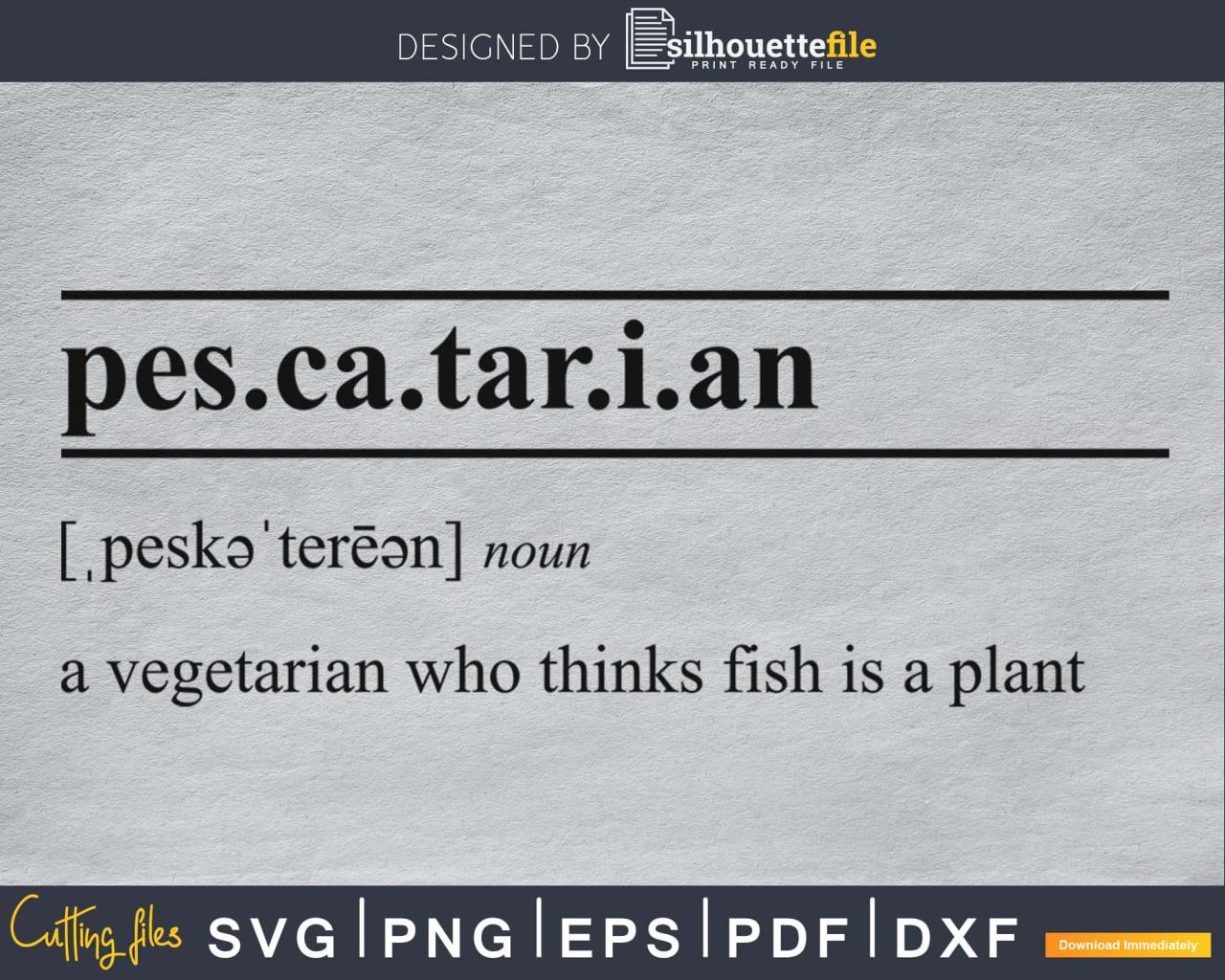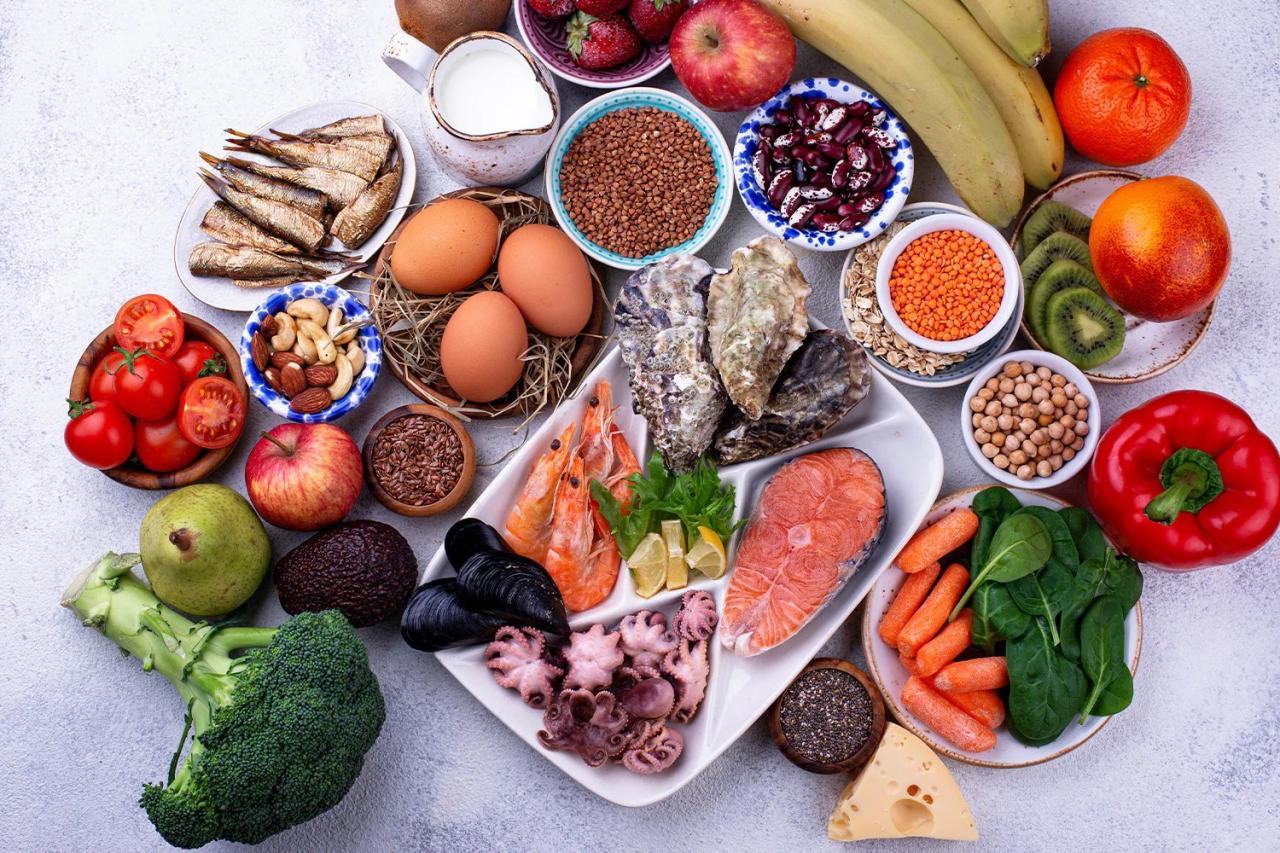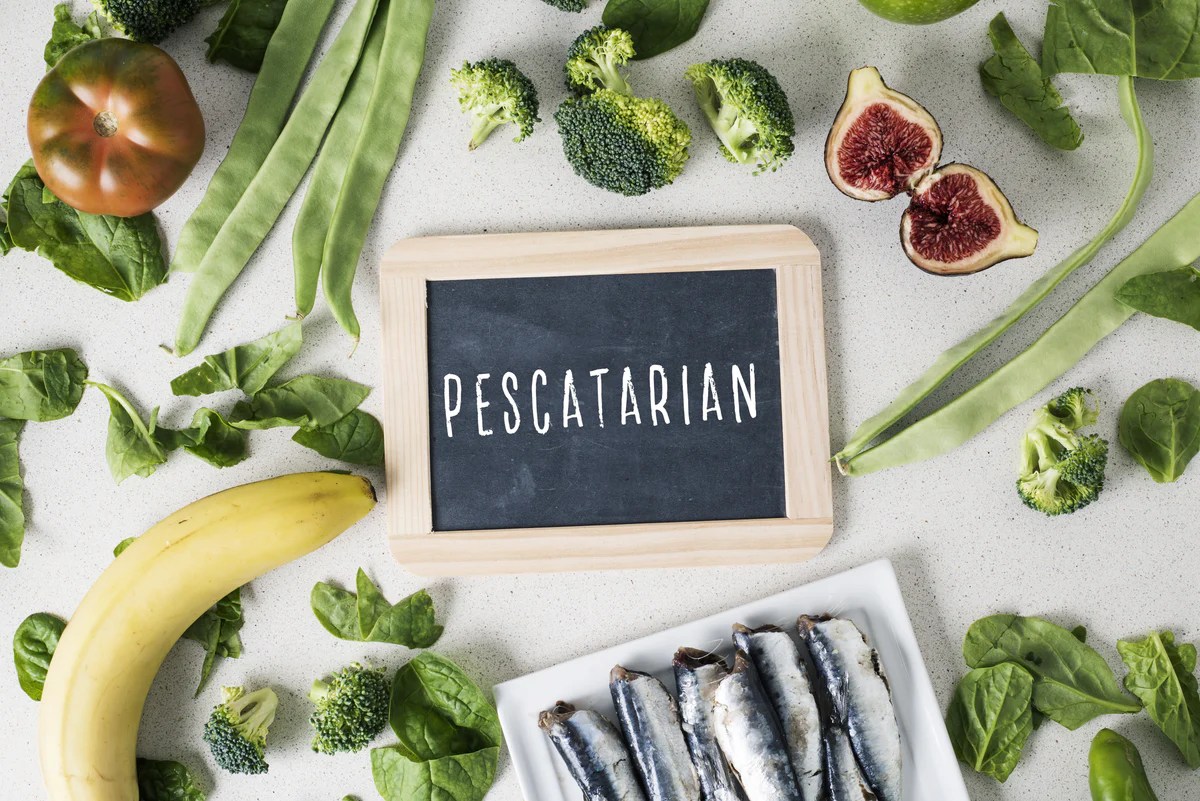Embark on a culinary journey with the pescaterian definition, a unique dietary approach that harmoniously blends the flavors of the sea with the goodness of plant-based foods. This comprehensive guide will immerse you in the world of pescatarianism, exploring its origins, dietary principles, health benefits, ethical considerations, and more.
From the etymology of the term to the nutritional value of seafood, we’ll delve into the essence of this increasingly popular diet, uncovering its nuances and empowering you with the knowledge to make informed choices about your dietary path.
Definition and Origins
The term “pescaterian” refers to individuals who adhere to a diet that primarily consists of fish and seafood, while excluding other types of meat such as poultry, red meat, or pork.
The term “pescaterian” is derived from the Italian word “pesce,” meaning “fish,” and the suffix “-arian,” which denotes a person who follows a particular diet or lifestyle. The term was first coined in the 1990s as a way to describe individuals who followed a semi-vegetarian diet that included fish.
Usage in Different Contexts
The term “pescaterian” is commonly used in the context of nutrition and dietary choices. Individuals who identify as pescaterians may do so for various reasons, including health, environmental, or ethical concerns.
- In the context of nutrition, pescaterians may choose to consume fish and seafood as a source of protein, omega-3 fatty acids, and other essential nutrients.
- From an environmental perspective, some pescaterians may opt for this diet due to concerns about the environmental impact of meat production, particularly the greenhouse gas emissions associated with raising livestock.
- Additionally, ethical considerations may also play a role in the adoption of a pescaterian diet, as some individuals may choose to avoid consuming meat for animal welfare reasons.
Dietary Practices
The pescaterian diet, a type of semi-vegetarianism, centers around the consumption of seafood while excluding other types of meat. This dietary approach emphasizes the nutritional benefits of fish and other marine life, while also aligning with ethical concerns regarding the treatment of land animals.
Types of Seafood Consumed and Excluded
Pescaterians incorporate a wide range of seafood into their diets, including:
- Fatty fish: Salmon, tuna, mackerel, sardines, and herring
- Lean fish: Cod, tilapia, flounder, and halibut
- Shellfish: Shrimp, crab, lobster, oysters, and clams
In contrast, pescaterians abstain from consuming meat from land animals, such as beef, pork, chicken, and turkey. They also avoid processed meats, such as bacon, sausage, and deli meats.
Typical Meals and Snacks
Pescaterian meals often revolve around seafood as the main protein source, accompanied by fruits, vegetables, and whole grains. Some examples of typical meals include:
- Grilled salmon with roasted vegetables and brown rice
- Tuna salad sandwich on whole-wheat bread with mixed greens
- Shrimp stir-fry with quinoa and steamed broccoli
Snacks for pescaterians can include:
- Fresh fruit, such as apples, bananas, and berries
- Vegetable sticks with hummus
- Trail mix with nuts, seeds, and dried fruit
Health Benefits and Considerations

A pescaterian diet offers a range of health benefits, primarily attributed to the consumption of seafood. Seafood is a rich source of omega-3 fatty acids, which have been linked to improved cardiovascular health, reduced inflammation, and enhanced brain function.
In addition to omega-3s, seafood provides a good source of protein, vitamins, and minerals. It is a particularly good source of vitamin D, which is essential for bone health, and iodine, which is necessary for thyroid function.
Embarking on a pescatarian diet can be a transformative journey. Pescatarian before and after stories showcase remarkable transformations in both physical and mental well-being. As individuals transition to a diet rich in seafood, fruits, and vegetables, they often experience increased energy levels, improved skin health, and reduced inflammation.
Nutritional Value of Seafood
- Omega-3 fatty acids:EPA and DHA are essential fatty acids that play a crucial role in heart health, brain function, and inflammation.
- Protein:Seafood is a high-quality protein source, providing essential amino acids for muscle growth and repair.
- Vitamin D:Fatty fish, such as salmon, tuna, and mackerel, are excellent sources of vitamin D, which is vital for bone health and immune function.
- Iodine:Seafood is a rich source of iodine, a mineral that is essential for thyroid hormone production.
- Other vitamins and minerals:Seafood also provides a good source of vitamins A, B12, and selenium, as well as minerals such as zinc and iron.
Potential Health Concerns
While a pescaterian diet is generally considered healthy, there are some potential health concerns to consider:
- Mercury:Some types of fish, such as tuna, shark, and swordfish, can contain high levels of mercury, which can be harmful to the nervous system.
- PCBs:Polychlorinated biphenyls (PCBs) are industrial chemicals that can accumulate in fish. PCBs have been linked to a range of health problems, including cancer and developmental issues.
- Seafood allergies:Some people may be allergic to seafood, which can cause symptoms such as hives, swelling, and difficulty breathing.
To minimize these health concerns, it is important to choose seafood wisely. Opt for low-mercury fish, such as salmon, sardines, and shrimp, and limit consumption of high-mercury fish. It is also important to cook seafood thoroughly to kill any harmful bacteria or parasites.
Embarking on a pescatarian diet can bring about noticeable transformations. Those who have adopted this lifestyle often report increased energy levels and improved overall well-being. A comprehensive study on pescatarian before and after effects highlights the positive impact on cholesterol levels, heart health, and weight management.
The inclusion of nutrient-rich seafood provides essential vitamins, minerals, and omega-3 fatty acids, contributing to a healthier and more vibrant lifestyle.
Environmental and Ethical Implications

Pescatarianism has significant environmental and ethical implications compared to other diets. Understanding these aspects can help individuals make informed choices about their food consumption.
From an environmental perspective, pescatarianism generally has a lower impact than diets that include meat and poultry. Seafood production contributes to greenhouse gas emissions, but to a lesser extent than livestock farming. Fish and shellfish often require less feed, land, and water resources compared to terrestrial animals.
Ethical Considerations, Pescaterian definition
Ethical considerations in pescatarianism revolve around the welfare of marine life and the sustainability of fishing practices. Some concerns include:
- Overfishing:Excessive fishing can deplete fish populations and disrupt marine ecosystems.
- Bycatch:Non-target species, such as dolphins and sea turtles, can be unintentionally caught and harmed during fishing operations.
- Habitat destruction:Fishing methods like trawling can damage coral reefs and other marine habitats.
Sustainable Seafood Practices
To address these ethical concerns, consumers can support sustainable seafood practices by:
- Choosing sustainably sourced seafood:Look for certifications from organizations like the Marine Stewardship Council (MSC) or the Aquaculture Stewardship Council (ASC).
- Reducing seafood consumption:Consuming less seafood can help reduce pressure on fish populations.
- Supporting responsible fishing methods:Encourage the use of selective fishing gear and avoid buying seafood from areas known for overfishing.
Comparison to Other Diets

Pescatarianism stands out from other dietary approaches due to its unique dietary principles and practices. In this section, we will delve into the similarities and differences between pescatarianism and other popular dietary choices, such as vegetarianism, veganism, and flexitarianism.
Vegetarianism
Vegetarianism encompasses a wide range of dietary patterns that exclude all types of meat, poultry, and fish. However, vegetarians consume dairy products, eggs, and honey. Pescatarians, on the other hand, include fish and seafood in their diet, making it a more flexible and inclusive vegetarian option.
Advantages of Vegetarianism:
- Reduced risk of chronic diseases, such as heart disease and certain types of cancer.
- Lower environmental impact compared to meat-based diets.
Disadvantages of Vegetarianism:
- May require careful planning to ensure adequate intake of protein, iron, and vitamin B12.
- Can be challenging to find suitable options when dining out or traveling.
Veganism
Veganism is the most restrictive plant-based diet, excluding all animal products, including meat, poultry, fish, dairy, eggs, and honey. Vegans rely solely on plant-based sources for all their nutritional needs.
Advantages of Veganism:
- Significant reduction in the risk of chronic diseases.
- Lower environmental impact compared to all other dietary approaches.
Disadvantages of Veganism:
- Requires meticulous planning and supplementation to obtain essential nutrients, such as vitamin B12, iron, and calcium.
- Can be challenging to maintain a balanced diet, especially when dining out or traveling.
Flexitarianism
Flexitarianism is a semi-vegetarian approach that emphasizes plant-based meals but allows for occasional consumption of meat, poultry, or fish. Flexitarians aim to reduce their meat intake for environmental, health, or ethical reasons.
Advantages of Flexitarianism:
- Provides flexibility in dietary choices.
- Can reduce meat consumption while still enjoying the occasional meat-based meal.
Disadvantages of Flexitarianism:
- May not offer the same health or environmental benefits as stricter plant-based diets.
- Can be challenging to define and maintain a consistent level of meat reduction.
Ultimately, the best dietary approach depends on individual preferences, health goals, and ethical considerations. Pescatarianism offers a balanced and flexible option for those seeking a plant-based diet with the inclusion of fish and seafood.
Recipes and Meal Planning: Pescaterian Definition
Pescaterian diets offer a wide range of meal options, from quick and easy breakfasts to satisfying dinners. To help you get started, here’s a table with pescaterian-friendly recipes organized by meal type:
| Meal Type | Recipe |
|---|---|
| Breakfast | Smoked Salmon Scramble |
| Lunch | Tuna Salad Sandwich |
| Dinner | Pesto Baked Salmon |
In addition to these recipes, here’s a meal planning guide with tips and strategies for creating balanced and satisfying pescaterian meals:
Meal Planning Guide
- Include a variety of foods:Pescaterian diets should include a variety of foods from all food groups, including fruits, vegetables, whole grains, legumes, and seafood.
- Get enough protein:Seafood is a good source of protein, but it’s important to include other protein sources in your diet, such as beans, lentils, and tofu.
- Make sure you’re getting enough omega-3 fatty acids:Omega-3 fatty acids are essential fatty acids that are important for heart health. Seafood is a good source of omega-3s, but you can also get them from plant-based sources, such as flaxseed and walnuts.
- Limit processed foods:Processed foods are often high in unhealthy fats, sodium, and sugar. Focus on eating whole, unprocessed foods as much as possible.
- Drink plenty of water:Water is essential for good health, and it’s especially important to drink plenty of water if you’re following a pescaterian diet.
Resources and Support
Navigating a pescatarian lifestyle can be made easier with the support of resources and a community of like-minded individuals.
Online communities, cookbooks, and support groups provide a wealth of information and encouragement. Professional organizations and websites dedicated to pescatarianism offer credible guidance and resources.
Online Communities
- Reddit’s r/Pescatarian community offers a platform for sharing recipes, tips, and support.
- Facebook groups like “Pescatarian Foodies” and “Pescatarian Support Group” connect pescatarians from around the world.
- Online forums like VeggieBoards and HappyCow provide dedicated spaces for pescatarian discussions.
Ending Remarks
As you conclude your exploration of the pescaterian definition, may this guide serve as a beacon of inspiration, guiding you towards a balanced, sustainable, and flavorful way of eating. Remember, every meal is an opportunity to honor your health, the environment, and the ethical implications of your food choices.
Embrace the pescatarian lifestyle, and let the symphony of flavors from both land and sea nourish your body and soul.
FAQ Overview
What is the pescaterian definition?
Pescaterianism is a dietary approach that primarily includes seafood, along with plant-based foods, while excluding meat and poultry.
What are the health benefits of a pescaterian diet?
Pescaterian diets are often associated with reduced risks of heart disease, stroke, and certain types of cancer, thanks to the inclusion of omega-3 fatty acids and other nutrients found in seafood.
What are some ethical considerations related to pescatarianism?
Pescaterians should be mindful of sustainable seafood practices and responsible fishing methods to minimize their impact on marine ecosystems.